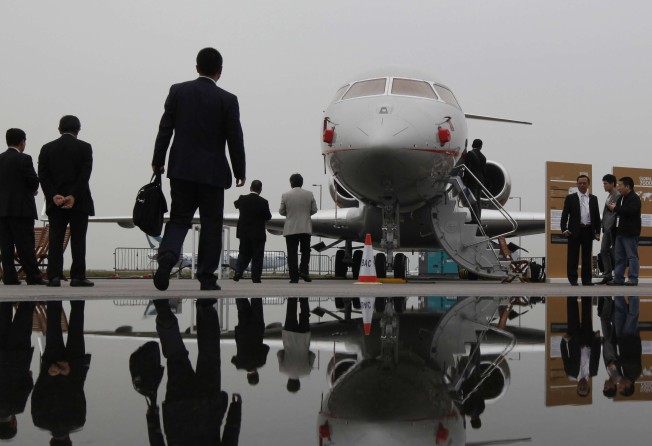
Chinese business jet firms clutch one another as industry slows

Business jet operators in China are seeking to forge alliances in order to survive what could be the worst year for the country’s slowing business aviation market.
With no major order announcements from aircraft manufacturers at the annual Asia-Pacific business aviation trade show in Shanghai this week, business jet management companies are opting for mergers and acquisitions and other means of consolidation.
NetJets China, the Chinese arm of the business jet company owned by Warren Buffett’s Berkshire Hathaway, said it would introduce mainland conglomerate China Minsheng Investment as a quarter shareholder. China Minsheng already owns Business Aviation Asia, the second largest private jet operator in Asia.
Hong Kong Jet, a HNA Group company, said it would acquire Asia Jet, a Hong Kong-based aircraft charter company. Metrojet, another major player owned by Hong Kong’s Kadoorie Group, announced a mainland Chinese joint venture with Shanghai Junhua Property Company to charter planes on the mainland.
The industry has been in a protracted slide in China as the government’s graft crackdown has held back officials, businesspeople and potential buyers from the market considered too conspicuous. This has resulted in a drop in new plane delivery and an exodus of second-hand planes. The number of business jets based in China, Hong Kong Taiwan and Macau grew just 4 per cent to 300 last year after 38 aircraft left the region, according to consultancy Asian Sky Group, which publishes an annual fleet report.
“There are too many players out there and not enough market,” said Metrojet’s chief executive Björn Näf. “There are more than 50 operators. That means, on average each has only six aircraft – that is very hard to make money...[so] consolidation is under way.”
Jeffrey Lowe, Asian Sky Group’s managing director, said Chinese operators are dealing with the problem by merging, downsizing their fleets as well as buying foreign companies with overseas air operator certificates. “They are trying to move their assets to some other jurisdictions that are performing better,” Lowe said.

But Metrojet’s Näf said the firm, backed by the owners of the Penisula hotels group that has a long-term aviation interest, is “not for sale” even though its position as Hong Kong’s leading private jet firm with 30 planes is being overtaken by Hong Kong Jet with its new acquisition.
Denzil White, Hong Kong Jet’s chief executive, said it would take over the management of eight planes from Asia Jet and build a charter sales department. “Scale would help us achieve cost-reduction and better fleet utilisation,” he said.
The deal is strengthening HNA Group’s lead in the private jet business in China. The conglomerate also owns Beijing-based Deer Jet, the private jet management and charter company that is the largest in Asia, even after its fleet dropped by 8 to 59 planes at the end of last year.
Andy Gill, senior director for business and general aviation, Asia-Pacific, at Honeywell Aerospace, said market uncertainties will keep short-term growth slow in China’s business aviation market. But he added that he remained confident of long-term demand. “2018 is where we’ll start to see purchase plans come back again,” he said.
According to Honeywell’s annual business aviation outlook report, global business jet delivery will drop to a low point in 2016 compared with the previous two years.